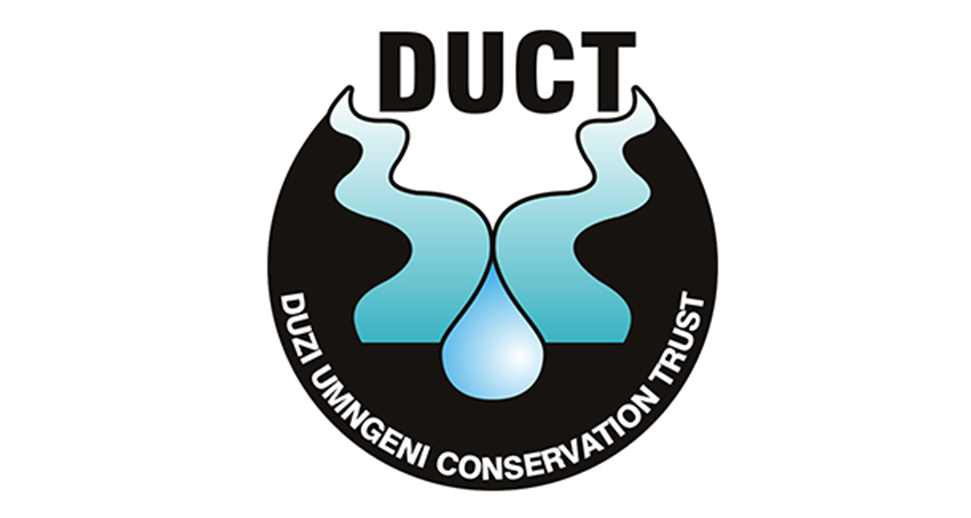After a lengthy break, our newsletter is back in production! Hopefully, you have all been keeping up to date via our website: www.duct.org.za
Snake awareness training: by Sithembiso Sangweni
The DUCT snake awareness training held at Fountain Hill Estate in May 2015 presented by ‘snake man’ Pat McKrill, was aimed at breaking the ice to our DUCT employees due to their almost daily exposure to snakes. The training focussed on snake bites (what to do when bitten) and snake behaviour (how to tell if you’re in danger of being bitten). The training included what to do when you come across a snake, where and when you are likely to encounter them, and snake handling.
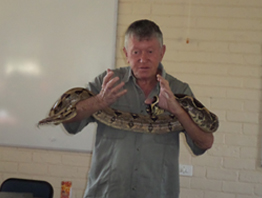 |
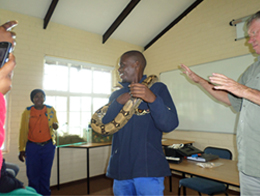 |
||
| Pat McKrill ‘snake man’ handling a Python. | DUCT Supervisor Sphamandla Dlamini |
DUCT Polystyrene Campaign: by John Butler and Sanele Vilikazi
Polystyrene in its various forms is well known to most of us today. It is used as a packaging material for electronic and other delicate equipment, as a building material, an insulator, and for the packaging of fast and pre wrapped foodstuffs. However what is not so well known are its effects on human health and the environment.
Styrene , the dangerous ingredient used in the manufacture of polystyrene products, oozes into the food and drinks we consume, eg when warming coffee hamburgers etc and ends up being stored in our bodies fatty tissue up to levels that can cause fatigue, nervousness, sleeping difficulties , blood abnormality and carcinogenic effects.
However it is not only the human health problems that cause a problem, being a non bio- degradable product with recycling problems it also has an effect on the environment taking millennia to biodegrade. It is estimated that ¼ to 1/3 of landfill sites contain polystyrene. Burning such a product releases noxious gasses into the air. As a water pollutant, leaching occurs when wet into the river systems clogging machinery, choking animals as particulates break up and eventually it finds its way into the oceans of the world with disastrous effects on marine life.
It is no wonder that part of DUCT`s mission is to campaign against the use of polystyrene especially as a food packaging system by investigating the banning of these products through legal enforcement and to champion the use of bio degradable packaging alternatives.
DUCT Pioneers Attend & Successfully Complete Weed Bio Control Short Course: by Sanele Vilakazi
From the 7th to 12th of September 2014 Sanele Vilakazi, Kholosa Magudu & Siyabonga Ndlovu were very much privileged to attend the annual Working For Water Weed Bio Control Short Course that was held at Rhodes University, Grahamstown.The opportunity to partake in such a short course was largely set up by Mr. John Butler who is the mentor of the three abovementioned pioneers. They are truly grateful to Mr. Butler for this as attending the course proved to be a worthwhile experience for all.
In brief, the course is a fully accredited Rhodes University short course comprising multiple learning modules. The pioneers attended lectures and classwork that were given by the top scientists/minds in the field of weed biocontrol. The course as a whole gave its participants a hands-on learning experience with multiple field trips that were conducted throughout the week. It was not all play as the pioneers were tasked to complete original projects designed to answer specific bio control research questions, complete a project write-up and present their findings in a series of research seminars.
All three pioneers successfully completed and passed the course with flying colours and such a qualification is sure to send them well on their way to establishing promising/successful career paths within their various fields of work.
In closing, the pioneers as a whole would like to thank everyone who made this opportunity possible and our very gracious hosts at Rhodes University.
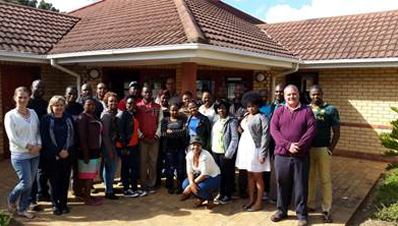 |
||
| Attendees of the Weed Bio-Control Course |
|
Education:
High School Career Exhibitions: by Kholosa Magudu
As part of the services rendered by DUCT’s Environmental Education Programme, DUCT attends local career expos for high school learners. This year we attended two Career Days for High Schools separately hosted by Hilton College and the South African National Biodiversity Institute. DUCT’s role was to highlight careers in the water sector for grade 12 learners. Our teams gave exposure to learners on our chosen Biodiversity career paths and the work that we do as an organization. In addition, we participated in a similar career exhibition at Varsity College earlier this year, and we managed to reel in some more volunteers.
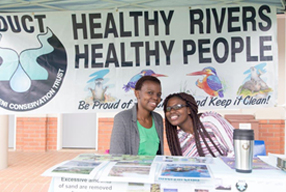 |
|
| Exhibition Day at Varsity College |
Progress update- Bilharziasis Project: by Kholosa Magudu and John Butler
At the beginning of this project, the DUCT team aimed to approach rural clinics as part of an Epidemiological survey to investigate the prevalence of Bilharzia along the uMsunduzi and uMngeni Rivers. This survey also comprised questionnaires on primary school-aged children to get a sense of what activities they do in the river and whether they might be potentially infected.
The majority of positive records were from the uMngeni clinics. Results from snail collection points along the uMsunduzi correlated to those of all the Pietermaritzburg clinics visited (no host snails, no clinic records). Based on these findings, our focus area for school surveys and intensified clinic record collection was the uMngeni region. Five schools were sampled (2 in KwaNgcolosi area, iNanda & 3 KwaXimba area).
Results from the Bilharzia questionnaires of one school analysed thus far (Table Mountain Primary school) indicate that most learners were not symptomatic. Further data analysis is on trends such as gender ratios and other trends comparatively across the schools sampled. The research continues with snail collection and screening for the cercariae. The clinic record data will be updated and all school surveys will be analysed to formulate viable/credible results with which to propose action from various stakeholders such as communities, traditional leadership, local education and health departments.
DUCT River Care Teams are Citizen Scientists too! : by Kholosa Magudu
Mini SASS has fast become a “second language” to most of our local schools. For this we have to thank mini SASS “engineers” and enthusiasts alike. DUCT as an organisation is committed to the advocacy of all mini sass activities to all (in its literal meaning)! To improve on our business-as-usual approach to mini sass training at DUCT, we have included River Care Teams (RCT) and Enviro champs, in addition to local learners and residents, in formal mini sass training. This is because our RCTs are our eyes on the ground and constitute an important component of our river health monitoring system.
This month, two enviro-champ teams and three River Care Teams were trained in-house on conducting mini SASS, recording results, and uploading them to the mini SASS website. Joining the DUCT team in the field was Duzi Productions’ Simphiwe (camera man and video editor), who captured the activities with enthusiasm. All these action-filled mini SASS sessions were organised by Sithembiso (Operations Manager). In addition a mini SASS training session was recently held with the Green Bobbies from Winterskloof Conservancy, assessing one of the Dorpspruit tributaries.
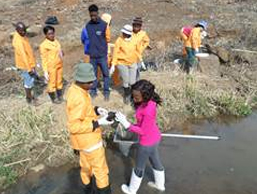 |
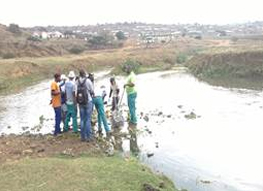 |
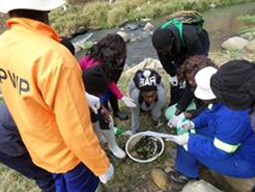 |
|||
| Ashdown Enviro Champs | Working with No. 9 River Care Team | Imbali Enviro Champs |
WWF Prince Bernard Scholarship for DUCT
From the pen of Kholosa Magudu (Recipient)
Being one of two South African recipients of the World Wildlife Fund’s Prince Bernard Scholarship is both an honour and a significant recognition for my work at an international level. My focus research area is on the importance of naturally functioning riparian ecosystems for improved in-stream water quality and was inspired by my river health work at DUCT.
Furthermore, I feel that DUCT nurtures career growth, especially for a novice like myself. The entire organisation, ranging from staff to directors, offers so much openness, guidance and takes interest in our endeavours as “SANBI pioneers”. Had it not been for DUCT’s General Manager, I would not have known about the scholarship or even applied for it, but in writing my motivation I mentioned my involvement in conservation work and highlighted some of my achievements and experiences at DUCT which I have gained under the mentorship of John Butler.
This is what he had to say about the scholarship “Am proud of her achievements for the DUCT organisation, just one of the many she has played a part in since becoming one of our “Pioneers”.
Litres for Education: by Jane Bain
DUCT has enrolled in the Litres for Education (LFE) programme which involves filling up at designated petrol stations. DUCT will receive 10c for every litre purchased. A ‘Litres for Education’ DISC is issued to participants, either under a personal number or the general DUCT number, for display on your windshield. The serving attendant records your purchase in his LFE register and that is all it requires to help raise funds for DUCT’s Environmental Schools Education Project!
Contact Jane on 033 345 7571 or email her on: This email address is being protected from spambots. You need JavaScript enabled to view it. to arrange participation and obtain a list of the relevant service stations.
Please have a look at the Litres for Education website www.litresforeducation.co.za for more information on this wonderful initiative.
Howick Happenings: by Doug Burden
Since the epic uMngeni River Walk from source to sea by the DUCT Team in 2012 the team have completed similar walks down the Lions, Dargle, Mpofana and Indezi Rivers with funding from N3TC.
The observations made and recorded during these walks assist greatly in drawing up management plans to improve both the quality and quantity of water in these rivers.
DUCT River Care Team, supervised by Alfred Zuma, has achieved good results clearing litter and Alien Invasive Plants from both the uMngeni and Symmonds Rivers flowing through Howick, as well as some rehabilitation work using gabion baskets.
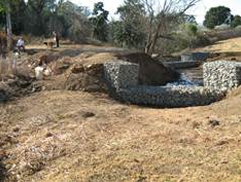 |
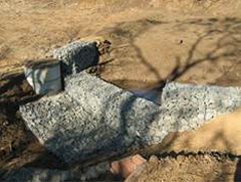 |
|||
| Examples of gabions in place | ||||
The DUCT ‘Eco-Champs’ continue to monitor and report pollution issues in Mpomphomeni and Shiyabazali. This project is going to continue with funding from the Umgugundlovu District Muncipality.
Current Projects:
Dept. of Environmental Affairs – thirteen River Care Teams are deployed starting from Edendale, down the Dusi River through the confluence with the uMngeni River, and down to Durban clearing Alien Invasive Plants and litter from both in and alongside the rivers.
WWF-SA – capacity building project in the upper reaches of the Dusi River.
Soon to start:
Sewer corridor clearing in the uMsunduzi Municipal area and
The continuance of the ‘Eco-Champs’ pollution monitoring project in Mpophomeni funded by the UMDM (district Municipality).
Challenges Remaining:
Some form of control over the rampant illegal sand-mining operations in the catchment.
Convincing creches, clinics and people at large, that the rivers are not the way to dispose of ‘used nappies’.
Staff News
- Last year we were sad to say goodbye to Caroline Clover after many years of valuable, faithful and enthusiastic service and we welcomed Coral Gold, who has ably taken over the financial reins, and Sue Walker, who assists Coral in the finance department.
- We also said goodbye to Siyabonga Ndlovu, one of our SANBI Interns, who secured a job in Forestry. During his short stay here Siyabonga made great strides in pursuing the illegal sandminers on the uMngeni and Dusi Rivers. Livhi Ndlovu (no relation!) joined us in Siyabonga’s place and is continuing to do good work in this area.
- We wish Caroline and Siyabonga well in their new ventures.
- Kholosa Magudu, a SANBI Intern, has been pursuing her studies while employed with us and we congratulate her on being one of only two South Africans to be awarded the Prince Bernard Scholarships for nature conservation.
- Sanele Vilakazi, amongst numerous other projects, keeps an eye on Environmental projects which require comment from interested parties.
- John Butler continues to give great guidance to the SANBI Interns in his capacity as Mentor while continuing in his role as our Pollution Control Officer.
- Sithembiso Sangweni, our Operations Manager, took on a Project Management Course (see previous article) while dealing with the challenges of becoming a Father for the first time.
- Wendy Ngcobo, our Education Officer, is on maternity leave and her assistants, Zakhele Mdunge and Hlengiwe Nxele are holding the fort in her absence.
- Doug Burden, our General Manager, keeps DUCT in the limelight with many institutions and has his finger on the office and field pulse.
- Jane Bain, our Admin. Manager continues to nag where necessary – with good effect!
- Bart Fokkens, our Field Manager, continues to look after the Lower uMngeni River Care Teams including Aquatic Weed Bio-Control.
- Richard Clacey brings a lot of value with his government and municipal connections and his running of the WWFSA funded uMsundusi Catchment Project.
-
Yours in conserving the Duzi and uMngeni Rivers,
The DUCT team

